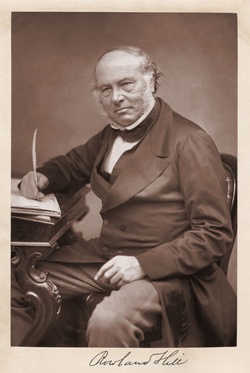
Geologist and science writer Nina Morgan celebrates the effect of the Universal Penny Post on geological debate
Geoscientist 22.02 March 2012
Picture: Sir Rowland Hill KCB FRS (1795 – 1879), father of the postal service.
The thousands of letters exchanged by 19th Century geologists and preserved in various archives provide a treasure trove of information for today’s scholars working to unravel the development of geological theories and thought. The postal delivery service in the 19th C, particularly within London and between London and other major cities, was impressive. There were numerous deliveries each day and letters often reached their sketchily indicated destinations amazingly quickly. But this efficiency came at a price. In the early years of the 19th C postal charges were very expensive -- rates were calculated on the basis of distance and number of pages in the letter, rather than by weight – and were paid by the recipient.
The introduction of the Universal Penny Post in 1840 – the brainchild of postal reformer, Rowland Hill – changed all that, and had a notable effect on communication, be it personal, business or scholarly. In a letter dated 26 September 1841 and preserved in the archive of the Hope Library at the Oxford University Museum of Natural History, the geologist John Phillips, writing from his field area in Haverfordwest to his sister Anne at their home in York, waxed lyrical about the improvements resulting from the introduction of the Penny Post.
“…Thanks to Hill & her Majesty’s late government, we at the distance of 350 miles sit & talk at ease … Heyday! What is all this to prove? The advantage of Penny Postage, for though I do not think the expression of gentle and kindly feeling nonsense, I feel that to make you pay a shilling for what you already know[,] that I am & ever will be your affectionate Brother[,] would be unreasonable.”
Before the introduction of the Penny Post indulging in lengthy and detailed geological discussion by letter must have been a costly business. This could have deterred the less well-off from entering in. So far as I know, no one has studied the correlation between geological correspondence sent and the incomes of the senders and recipients, or calculated whether the average length of geological letters increased after the Penny Post was introduced. Nor have I heard any pathetic stories of poor geologists being unable to accept delivery of a potentially illuminating letter for want of funds to pay the postal charges. What is clear, however, is that the high postal charges prevailing before the introduction of the Universal Penny Post weren’t enough to deter the Gentlemen of the Geological Society from writing to each other frequently, voluminously – and often illegibly!
*Nina Morgan is a geologist and science writer based near Oxford.
Acknowledgment
Sources for this article include an article about The Penny Black on the British Postal Museum & Archive website
http://postalheritage.org.uk/page/pennyblack and a letter written by John Phillips from Haverfordwest to his sister Anne in York dated 26 September 1841 which is preserved in the archive of the Hope Library at the Oxford University Museum of Natural History.
- If the past is the key to your present interests, why not join the History of Geology Group (HOGG)? For more information and to read the latest HOGG newsletter, visit: www.geolsoc.org.uk/hogg, where the programme and abstracts from the Conference on Geological Collectors and Collecting are available as a pdf file free to download.